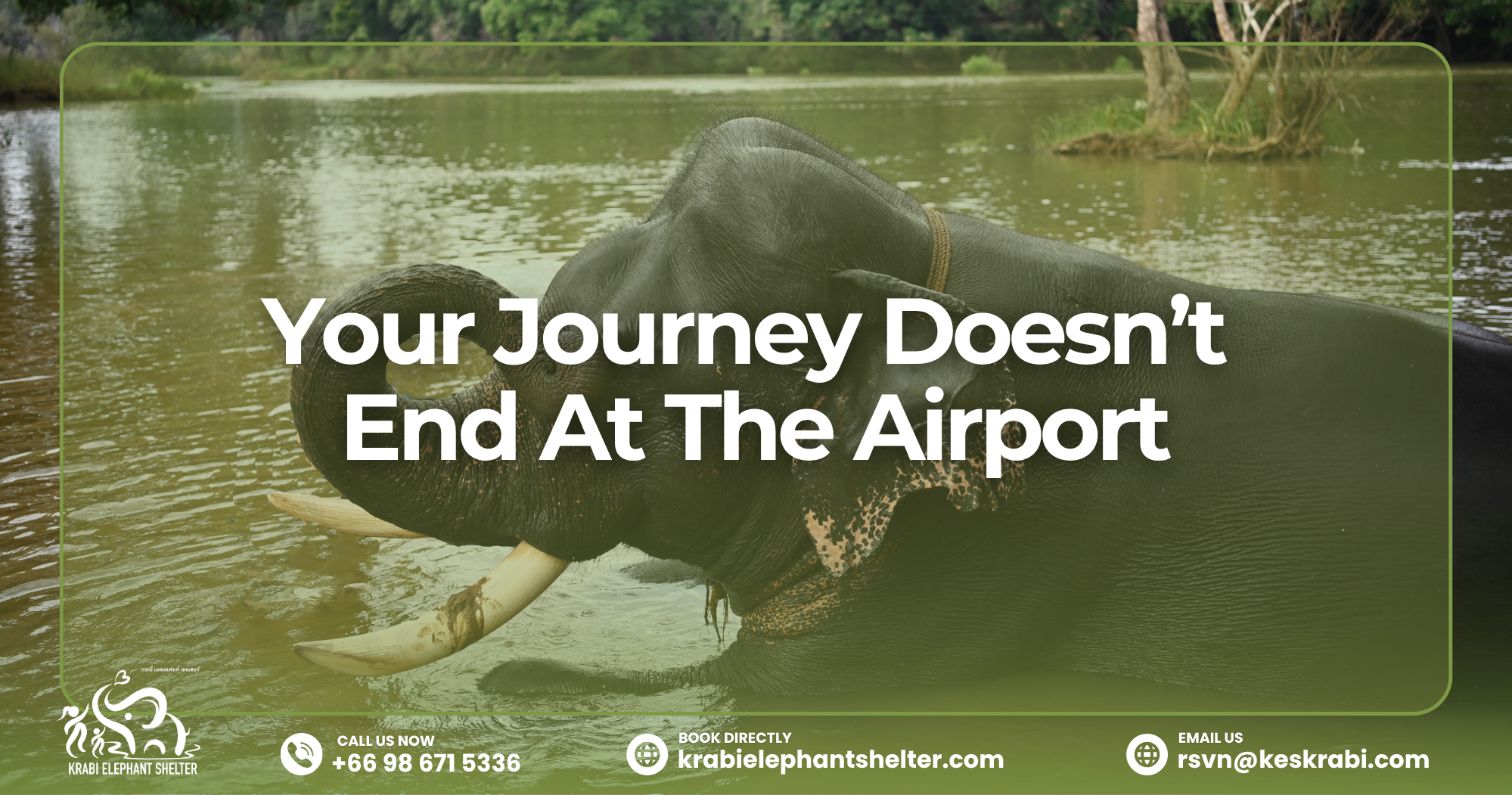You’ve had a chance to see an elephant face to face, maybe through a visit to a sanctuary, trekking with a guide, or volunteering in a foreign country. You saw their smarts, kindness, and the amazing feeling of having them around.
One meaningful way to continue supporting elephant conservation is to stay connected and informed. You can follow and promote ethical sanctuaries and conservation groups on social media, donate to trusted organizations, or even symbolically adopt an elephant. Spreading awareness within your community—whether through conversations, blog posts, or school projects—can inspire others to care, too.
Small steps like choosing elephant-friendly tourism or refusing to support businesses that exploit wildlife make a lasting difference. From wherever you are, your voice and choices still matter.
Even as your trip finishes and you return, you might start thinking: What’s next? What can I do to help elephant conservation when I’m so far from the elephants?
You can continue to help after your trip ends, which is the good news. The help that matters most usually appears when you’re not there. Read on to find out how you can stay engaged and always support the well-being of elephants.
Choose Ethical Travel To Promote Elephant Conservation Efforts
1. Donate To Ethical Elephant Conservation Organizations
Directly supporting elephant conservation is possible by giving money to groups working for elephants. Funds from donations help sanctuaries, rescue centers, and anti-poaching groups provide necessary veterinary care, improve habitat, feed the animals, provide safety measures, and educate people.
You should always research places to donate before contributing.
- Transparency matters: Organizations that show their yearly reports and financial records are more transparent, and that matters.
- Impact-focused: Choose wildlife organizations active in caring for elephants, protecting their home, or helping local residents.
- Ethically run: Don’t choose places that let you ride elephants or have them performing tricks for funds labeled as conservation.
Some respected groups focused on elephants are Save the Elephants, Elephant Nature Park, and the Sheldrick Wildlife Trust.
Every small deposit each month is appreciated. Many organizations allow you to sign up for information updates, read newsletters, and even ‘sponsor’ a virtual elephant.
2. Be An Advocate In Your Own Community
Raising your voice for elephants doesn’t require a large online following. Begin asking those around you and online, like family, friends, and social media. A lot of people aren’t aware that elephants can be harmed by losing their homes, by the trade of wild animals, and sometimes by how they are used in tourism. Sharing this information helps build awareness and support for elephant conservation.
Here are some ways to advocate:
- Share your experience: Post images and tales from your trip, pointing out what you discovered and why you think ethics in tourism make a difference.
- Start conversations: Use the occasion of World Elephant Day (August 12) to discuss elephants with those around you.
- Host fundraisers or awareness events: Host a fundraising event or a talk anywhere, from Facebook birthday fundraisers to local libraries or schools to help raise awareness.
Sharing your interest in elephants helps others realize that it’s not only about the animals, but also about the communities, ecosystems, and the future for all of us.
3. Choose Ethical Travel In The Future
Taking part in responsible tourism sends an important signal. Spending money can either help injustice or encourage good causes. Keep elephants in mind as you select which attractions to visit while on your next trip, especially those that support elephant conservation.
- Avoid attractions that offer elephant rides, tricks, or close-contact selfies. These often involve harsh training and unnatural living conditions.
- Support true sanctuaries and observation-only experiences where elephants are free to roam and behave naturally.
- Ask questions: Responsible operators will be transparent about how they treat their animals.
The tourism industry listens to demand. By voting with your wallet, you can help shift the industry toward more humane practices.
4. Support Community-Led Conservation Efforts
The health of nearby communities is strongly affected by elephant conservation. If people can study, receive medical attention, and have enough income, they usually protect animals instead of hunting them for their own needs.
Some ways you can help from afar:
- Buy fair-trade products from conservation-linked communities—many sanctuaries sell handcrafted items that directly benefit local artisans.
- Support NGOs that work on community empowerment in elephant range countries.
- Sponsor education programs for children growing up near elephant habitats.
When conservation and community development go hand in hand, everyone wins—especially the elephants.
5. Stay Informed And Keep Learning
Conservation work is not simple. We’re not simply protecting elephants; we deal with politics, economics, and the problems that come from humans and wildlife. When you know more about the matters, you’re better able to assist in positive ways.
- Read books and watch documentaries about elephant behavior, poaching, and the ivory trade.
- Follow conservationists and organizations on social media to stay updated on current challenges and wins.
- Subscribe to newsletters from NGOs and sanctuaries—you’ll receive updates on policy changes, rescue stories, and ways to help.
An informed supporter is a powerful ally. Your continued curiosity and willingness to learn amplify your impact on elephant conservation long after your visit ends.
6. Adopt A “Conservation Mindset” In Daily Life
Traveling far from elephants is no problem; you can still support them in other ways.
- Reduce your plastic use—pollution affects ecosystems that many animals, including elephants, depend on.
- Be mindful of your carbon footprint—climate change is reducing habitat and water availability for elephants.
- Avoid products that contribute to deforestation, like unsustainable palm oil, which destroys habitats in Southeast Asia.
Every eco-friendly decision you make at home echoes around the globe, helping preserve the wild places elephants need to thrive and supporting elephant conservation.
7. Write To Leaders And Policymakers
What you say and how you say it is important. Support stronger wildlife protection laws by sending letters or adding your name to online petitions. Together, prevent ivory from being traded internationally, make sure anti-poaching efforts are strong, and help save important routes for elephants—all key parts of elephant conservation.
WWF and IFAW send out alert actions that anyone can join. Small actions like these have spurred meaningful policy changes in different countries.
Your Journey Doesn’t End At The Airport
It can be a very special experience to care for elephants, but it’s just the start of something bigger. The work of proper elephant conservation takes time. It requires us to keep acting, deciding, and showing kindness all the time.
If you follow up, you join an international effort to make sure future children can watch elephants where they should be—in the wild.
Keep the memory of what you felt when you saw them—heroic, knowledgeable, and unrestricted. Use the example it sets as your motivation every single day.
Since the elephants are depending on our support, let’s continue standing up for elephant conservation.
Ready to do something about it? Today, check out an ethical elephant organization and let someone know what they do. Small contributions from you truly aid the efforts to protect elephants.
Book your trip to Krabi Elephant Shelter now!
Phone: (+66) 98 671 5336
Email: [email protected]
Book directly at krabielephantshelter.com





